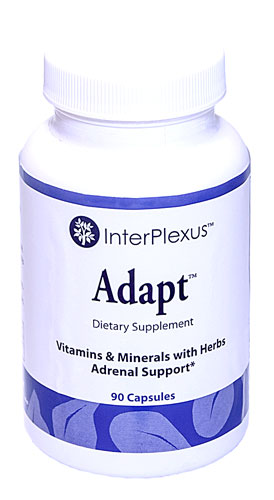In today’s go-go-go culture of 24-hour news, incessant social media updates, and looming work and family obligations, stress seems to be more common than ever. And while some occasional stress is OK, the chronic stress that many of us experience is wreaking havoc on our bodies—particularly our adrenal glands.
What are the adrenal glands?
The adrenal glands are two thumb-sized organs that sit above your kidneys and are part of the endocrine system. The adrenals are involved in the production of over 50 hormones that drive almost every bodily function, including glucocorticoids that balance blood sugar, mineralocorticoids that maintain healthy blood pressure, sex hormones like estrogen and testosterone that are involved in reproduction, and adrenaline/epinephrine that govern the “fight or flight” stress response.
The adrenals also work closely with the hypothalamus and the pituitary gland in a system known as the hypothalamus-pituitary-adrenal axis (HPA axis).
Adrenal fatigue, defined
Adrenal fatigue is a controversial topic among many doctors and health experts, mostly because experts believe that the name is misleading, since the adrenals don’t actually become too tired to do their job. A better name for this condition, then, may be “adrenal dysfunction,” which describes the inability of the adrenal glands to keep up with the high amounts of daily stress that many people face today.
This onslaught of stress—and the failure of the adrenals to properly process it—can result in the release of high amounts of stress hormones including cortisol and adrenaline, reproductive problems like irregular periods or infertility, thyroid related issues, exhaustion, depression and more.
Common signs that your adrenals are not functioning properly include:
- Chronic fatigue (always feeling tired)
- Brain fog
- Hair loss
- Hormone imbalances
- Weakened stress response
- Insulin resistance
- Lightheadedness
- Decreased sex drive/libido
- Moodiness and irritability
- Depression
- Muscle or bone loss
- Skin breakouts, rashes and other ailments
- Trouble sleeping, whether falling or staying asleep
- Weight gain despite not eating more or exercising less
- Sweet and salty food cravings
- Increased susceptibility to autoimmune conditions
- Lack of motivation to exercise or be active
While just about every person is likely to experience some type of adrenal fatigue or dysfunction at some point in their life—particularly after a stressful event or major life change—there are some people who are at much higher risk of developing this condition. Those people include: college or post-grad students cramming for exams and starting new jobs, anyone moving to a new and unfamiliar location, busy new parents who are sleep deprived, caregivers or spouses dealing with a family member who has an illness, military personnel or vets, or anyone recovering from surgery, a traumatic break up or a major illness.
Additionally, certain dietary and lifestyle factors can increase adrenal fatigue risk. Some of the top offenders include:
- Consuming too much caffeine
- Alcohol and drug use
- Sleep deprivation (getting less than 7-8 hours most nights)
- High-stress lifestyle, or dealing with stressful experiences like death of loved one, divorce or surgery
- Exposure to environmental toxins and pollution
- Over-exercising
- Under-eating
- Leaving food allergies/intolerances untreated
- Eating lots of processed/refined carbs, which are low in fiber, often high in sodium and made with processed vegetable oils, easy to over-eat, and not very satisfying
- And eating lots of sugary snacks and beverages, which are basically empty calories and don’t have much “staying power”, leaving you craving more food shortly after.
- Nutrient deficiencies, such as not eating enough protein, healthy fats or in some cases complex carbs or even calories themselves.
Natural ways to support adrenal health
Eating a balanced, whole-foods diet that includes enough protein, healthy fats, vitamins, minerals and fiber can help get your adrenals back on track. This is especially important if you’re very active, stressed, or dealing with existing health conditions (such as an autoimmune disorder, thyroid condition, hormonal imbalance, etc.). Of course, getting enough sleep, resting when needed, and managing stress are also crucial for keeping the adrenals healthy.
Sometimes, though, even when we’re eating the proper diet and getting enough rest, we still need additional nutritional support to combat adrenal fatigue. With that in mind, here are five supplements and foods that can help support adrenal function and get you feeling good again in no time:
1. Adaptogen herbs — Adaptogen herbs, such as ashwagandha and rhodiola, help to build your body’s defenses against stress and support hormonal balance.†
2. Omega-3s from fish and fish oil supplements — Omega-3 fatty acids, found in fish like salmon and mackerel, as well as fish oil supplements, have anti-inflammatory properties and help support cognitive function/mental health.†
3. Medicinal mushrooms — Much like adaptogens, medicinal mushrooms such as chaga, reishi and cordyceps help support the nervous and endocrine systems, bringing hormones back into balance. They can be useful for supporting immune system function, overcoming fatigue, dealing with anxiety and recovering from an illness.†
4. Sea vegetables/seaweed — Sea vegetables, such as blue-green algae, nori, dulse, wakame and others provide iodine, magnesium, potassium, calcium, antioxidants and many other nutrients that support both the thyroid and adrenal glands. This can help to support normal hormone output, support a healthy metabolism and fight against fatigue.†
5. B vitamin complex — When you’re under a lot of stress you require more B vitamins to keep your energy up. Deficiency in vitamin B12 is especially common among people who don’t consume quality protein sources or have difficulty with nutrient absorption due to gut troubles. We need B vitamins in order to turn nutrients from food into usable energy, to help balance hormones, and to prevent brain fog. The best way to obtain enough B vitamins is to eat a variety of whole foods, including poultry, grass-fed beef, organ meats (like liver), wild-caught fish, whole grains, eggs, nuts, seeds, nutritional yeast, mushrooms and seaweeds.
†These statements have not been approved by the Food and Drug Administration. These products are not intended to diagnose, treat, cure or prevent disease.




